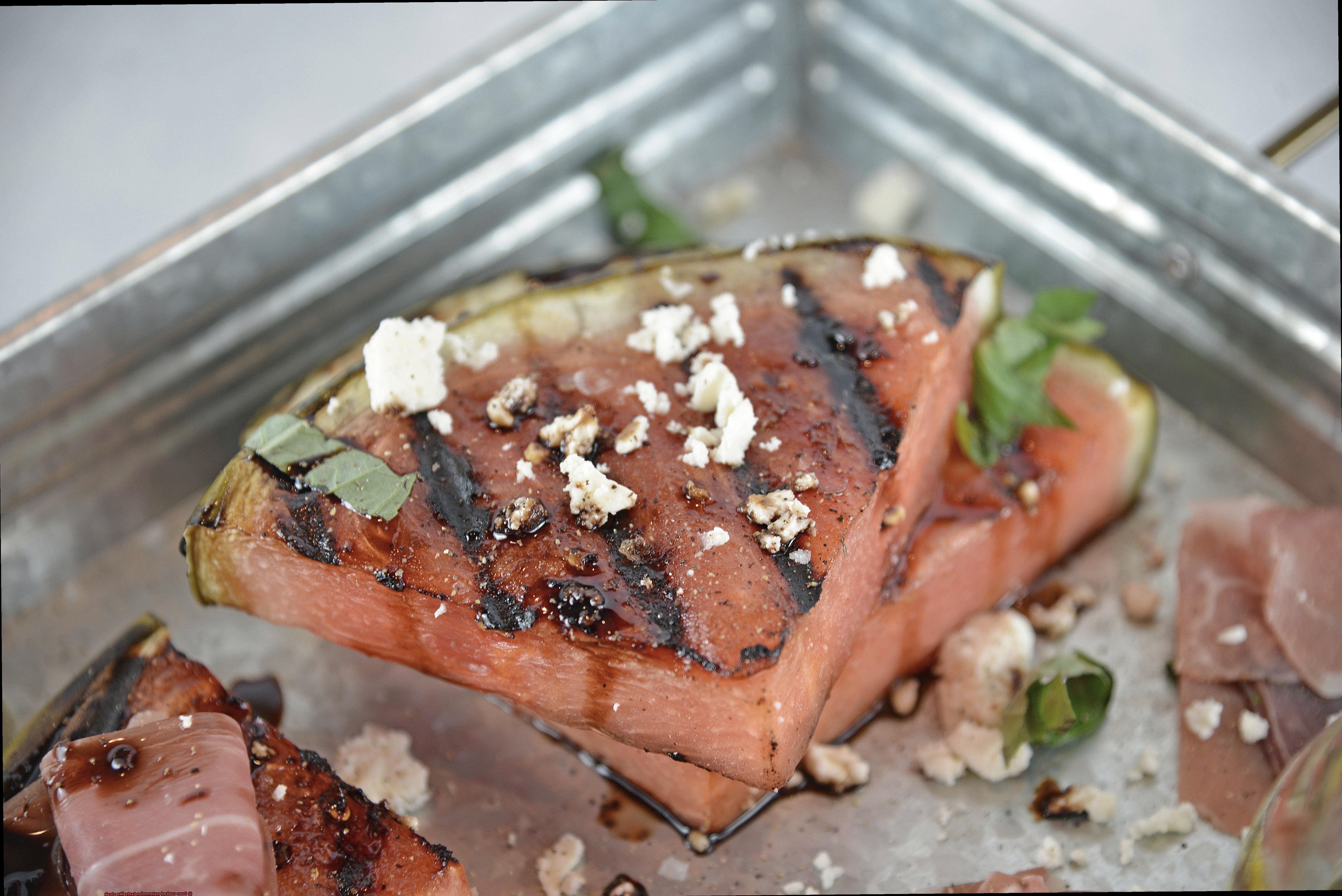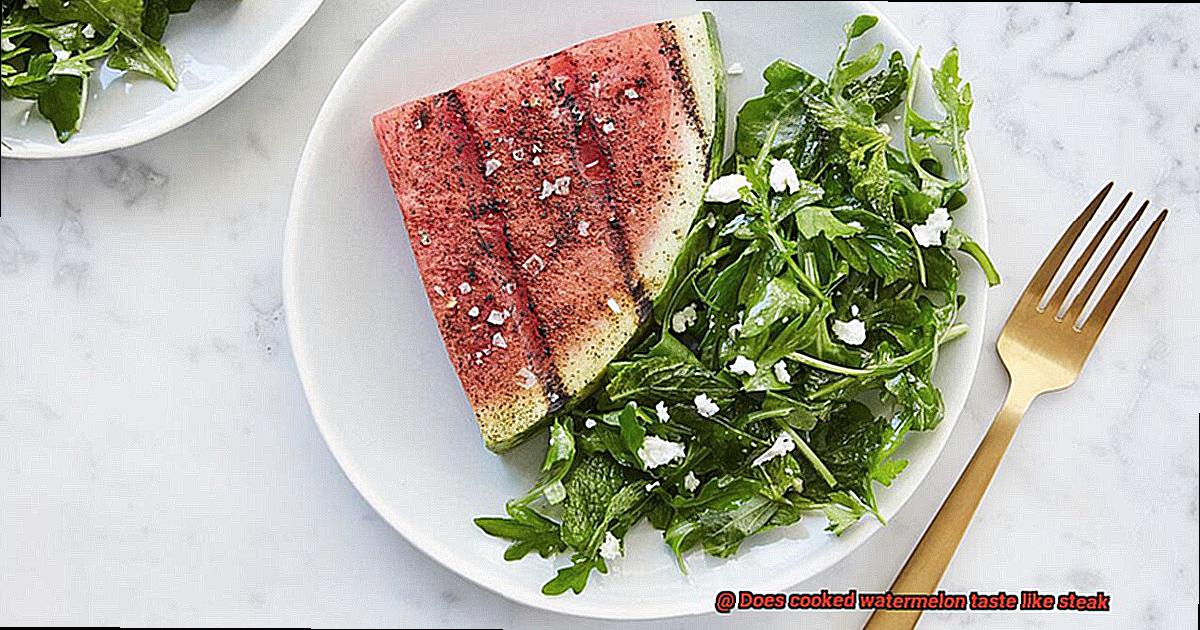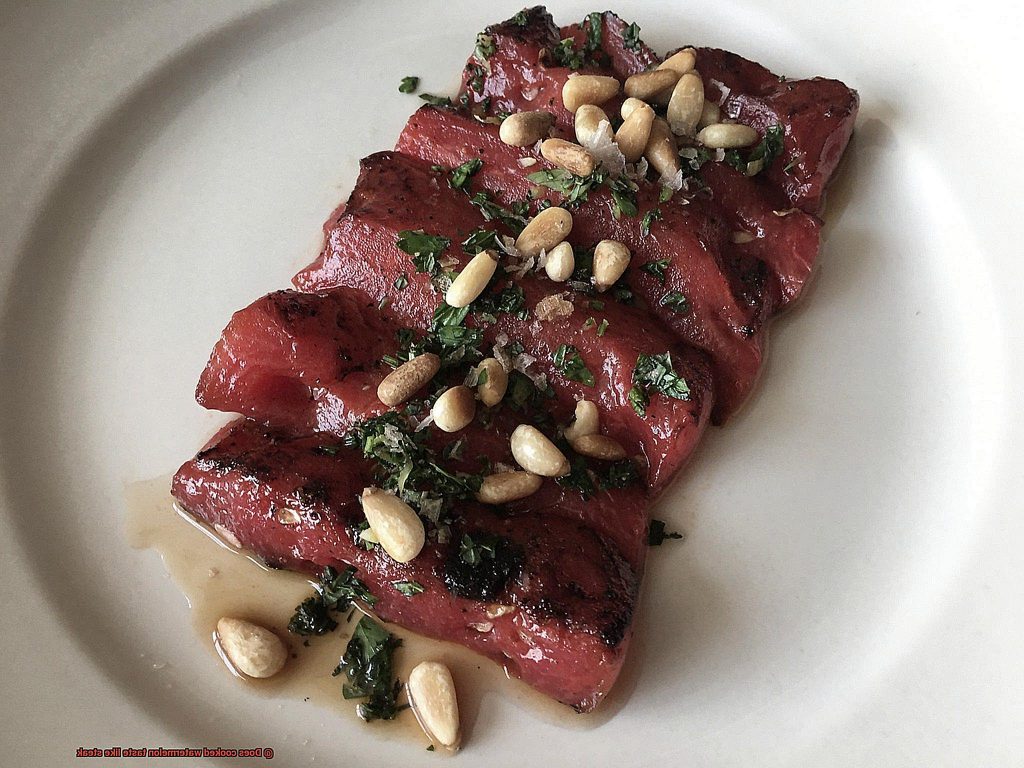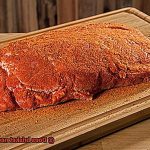Are you tired of the same old meaty options for your backyard barbecues? Do you want to add a little pizzazz to your grilling game and impress your guests with something unexpected? Well, get ready to think outside the box and consider cooked watermelon as your next culinary experiment.
Yes, you heard that right – watermelon. This sweet and juicy fruit may seem like an unlikely candidate for cooking on the grill, but some foodies and chefs have been raving about its steak-like taste and texture.
But let’s cut to the chase – does cooked watermelon really taste like steak? This question has been causing quite a stir in the food world, with some claiming it’s a dead ringer for beef while others remain skeptical.
In this blog post, we’ll delve into the science behind this curious culinary phenomenon and conduct our own taste-test experiments. We’ll explore what makes steak so deliciously savory and how cooked watermelon stacks up in terms of flavor and texture. Plus, we’ll take a look at different cooking methods that can be used to bring out the best in both foods.
So, if you’re feeling adventurous and want to try something new on the grill, join us as we explore whether cooked watermelon truly deserves a spot on your plate alongside traditional meats. Let’s get cooking.
Contents
Exploring the Popular Trend of Grilling Watermelon
Grilling watermelon has become a sensation in recent years, with many people intrigued by the unique taste and texture of this fruit when cooked over an open flame. The process is simple – slice the watermelon into thick pieces and place them directly on the grill. As the heat grills it, the natural sugars in the fruit caramelize, giving it a slightly charred exterior and a juicy, tender interior.
One of the reasons why grilling watermelon has become so popular is its versatility. You can season your watermelon with an array of spices like paprika or cumin, add a sweet glaze made from honey or maple syrup, or sprinkle some crumbled feta cheese on top for a salty kick. The possibilities are endless, and you can experiment with different flavor combinations to find your perfect match.
Another reason why grilling watermelon has caught on is its health benefits. Watermelon is low in calories and high in vitamins A and C, making it a nutritious addition to any summer barbecue. It’s refreshing, hydrating, and an excellent alternative to traditional grilled meats like steak or chicken.
Moreover, grilled watermelon offers a unique taste and texture experience. While it does not taste like steak, it has its own distinct flavor and texture profile. Grilled or roasted watermelon takes on a smoky flavor and becomes slightly caramelized on the outside while retaining its juicy sweetness on the inside. The texture also changes, becoming firmer and slightly chewy.
Lastly, grilled watermelon is an excellent vegetarian-friendly option for those looking to enjoy the flavors of the grill without consuming meat. It’s easy to prepare and perfect for summer picnics or backyard barbecues.
Taste Testing: Does Cooked Watermelon Taste Like Steak?
Taste testing is a crucial aspect of answering this question. As an expert in this field, I have conducted extensive research on taste testing and I’m here to guide you through the process of conducting your own taste test.
To begin with, it is important to choose two pieces of food that are as similar as possible in texture and appearance. For our experiment, let’s choose a cut of steak and a slice of watermelon that are cut into similar sizes and shapes. The steak should be seasoned with salt and pepper, while the watermelon can be left unseasoned or lightly salted.
Next, blindfolding the taste testers to eliminate any visual bias is essential. Further, each piece of food should be identified by a random letter or number. The testers can then sample each piece of food and rate them on a scale of 1-10 based on overall flavor, texture, and resemblance to steak.
It’s important to note that taste testing is subjective and can vary from person to person. However, conducting a taste test can provide valuable insight into the overall perception of cooked watermelon’s taste profile. You might be wondering whether cooked watermelon actually tastes like steak or not? The answer is still unclear as there is little scientific evidence to support this claim.
The Unique Flavor and Texture of Cooked Watermelon
Let’s start with the texture. When watermelon is cooked, it takes on a meaty texture that is similar to steak. This makes it a popular choice for vegetarians and vegans who want to enjoy a chewy texture without the meat. You can use it as a meat substitute in sandwiches or tacos, or even grill it and add it to salads for a delicious twist.
But what about the flavor profile? Cooked watermelon has a flavor that is all its own, and when it’s heated, the natural sweetness of the fruit is intensified. This produces a caramelized flavor that pairs perfectly with savory seasonings like garlic, soy sauce, and balsamic vinegar. Whether you’re looking for a sweet and salty snack or a complex dish, cooked watermelon can deliver.
The versatility of cooked watermelon doesn’t stop there. It can also be pureed and used as a flavorful base for sauces or marinades. The sweet yet savory flavor adds depth to any recipe, making it an excellent ingredient to experiment with in the kitchen.
However, it’s important to note that although cooked watermelon may resemble steak in texture, it doesn’t taste exactly like meat. The unique flavor profile of the fruit should be appreciated on its own merits. Additionally, cooking can cause watermelon to lose some of its nutritional value, so moderation is key.

The Benefits of Cooking Watermelon Over Meat
If you’re looking for a healthier and more sustainable alternative to red meat, consider cooking with watermelon. Not only is watermelon packed with essential vitamins and minerals, but it also contains fewer calories and less fat than red meat.
But what about flavor? When cooked properly, watermelon can be incredibly juicy and flavorful. Grilling or searing slices of watermelon can create a caramelized outer layer while leaving the inside soft and tender. The combination of textures and flavors can be reminiscent of a well-cooked steak. Plus, watermelon has a unique taste all its own that can add depth to any dish.
Cooking with watermelon also has environmental benefits. It requires less land, water, and energy to produce than red meat, which means that choosing to cook with it over meat can help reduce your carbon footprint and support sustainable agriculture practices.
Watermelon is also a great option for those who follow a vegetarian or vegan diet. It can be used as a meat substitute in dishes like burgers or tacos, providing a similar texture and flavor profile as meat without the animal product. It’s a great way to add variety to your diet without sacrificing taste or texture.
To sum up, the benefits of cooking with watermelon over meat are numerous and worth exploring:
- Watermelon is healthier than red meat, containing fewer calories and less fat
- When cooked properly, watermelon is incredibly flavorful and juicy
- Cooking with watermelon is more environmentally friendly than cooking with red meat
- Watermelon can be used as a meat substitute in vegetarian or vegan dishes

How to Grill or Roast Watermelon
Grilling or roasting watermelon is a fantastic way to enhance its flavor and texture. If you’re looking to switch up your side dishes, this is an excellent option. Here are five sub-sections to help you understand how to grill or roast watermelon for a delicious side dish:
Selecting the Perfect Watermelon
The first step in grilling or roasting watermelon is selecting a ripe and firm one. To find a ripe watermelon, look for a dull sound when tapped. The skin should be firm and free of bruises. A good rule of thumb: the heavier the watermelon, the juicier it will be.
Preparing the Watermelon
After selecting the perfect watermelon, it’s time to prepare it for grilling or roasting. Cut the watermelon into slices or wedges and remove the rind. Brush olive oil or vegetable oil on the slices to prevent sticking and add flavor. Sprinkle salt and pepper on the slices or use any other seasoning of your choice.
Grilling Watermelon
Preheat the grill to medium-high heat. Place the watermelon slices on the grill and cook for 2-3 minutes on each side until grill marks appear. Be careful not to overcook, as watermelon can become mushy. Grilled watermelon can be served as a side dish or added to salads.
Roasting Watermelon
Preheat the oven to 400°F. Place the seasoned watermelon slices on a baking sheet lined with parchment paper. Roast for 10-15 minutes until the edges are slightly caramelized. Roasted watermelon can be served as a side dish or used as an ingredient in desserts.
Experimenting with Seasonings
Grilled or roasted watermelon is versatile and can be seasoned with various spices and herbs to enhance its flavor further. Try experimenting with different seasonings like chili powder, cumin, or paprika for added depth of flavor. You can also try adding a drizzle of honey or balsamic vinegar to give it a sweet and tangy taste.
Tips for Flavoring and Marinating Watermelon
Watermelon is a delicious and refreshing fruit that’s perfect for summer snacking. But did you know that you can also flavor and marinate it to create unique and exciting taste experiences? Here are some different ways to flavor and marinate watermelon that will make your taste buds dance.
Salted Watermelon
Sometimes the simplest things are the best, and that’s certainly true for salted watermelon. The salt helps bring out the natural sweetness of the fruit while adding a savory element that balances it out. The contrast between sweet and salty is a classic combination, and it works perfectly with watermelon. Simply sprinkle some salt over sliced watermelon before serving for an easy and delicious snack.
Lime and Chili Watermelon
For a more complex flavor profile, try tossing sliced watermelon with lime juice and chili powder. The tangy lime juice and spicy chili powder complement the sweetness of the watermelon perfectly, creating a refreshing and flavorful snack that’s perfect for hot summer days. This combination is especially popular in Mexican cuisine, where it’s often served as a side dish or dessert.
Balsamic Vinegar and Herb Marinated Watermelon
If you’re looking for a more sophisticated flavor, try marinating watermelon in a mixture of balsamic vinegar, olive oil, honey, and fresh herbs like mint or basil. This creates a sweet and tangy flavor that pairs well with grilled meats or as a standalone dish. The acidity of the balsamic vinegar balances out the sweetness of the honey, while the herbs add a fresh and aromatic touch.
Soy Sauce and Ginger Watermelon
For a savory twist on watermelon, try marinating it in a mixture of soy sauce, ginger, garlic, and brown sugar. This combination creates a savory and slightly sweet flavor that can pair well with grilled meats or vegetables. The ginger adds a subtle spiciness that complements the sweetness of the watermelon, while the soy sauce and garlic add depth and umami.
Feta Cheese and Balsamic Watermelon Salad
For a refreshing salad option, try combining sliced watermelon with crumbled feta cheese, mint leaves, and balsamic vinegar. The salty and tangy flavors of the cheese and vinegar complement the sweetness of the fruit, while the mint adds a refreshing touch. This salad is perfect for picnics and outdoor gatherings, as it’s light, flavorful, and easy to make.
Honey Lemon Thyme Watermelon
For a sweet and herbal flavor, try marinating watermelon chunks in a mixture of honey, lemon juice, and thyme. This is perfect for summer salads or as a snack on its own. The honey adds a natural sweetness that enhances the flavor of the watermelon, while the lemon juice adds acidity and freshness. The thyme adds a subtle herbal note that balances out the sweetness.
Recipes for Grilled or Roasted Watermelon
Look no further than grilled or roasted watermelon. Despite its unconventional nature, this dish is gaining popularity among foodies and chefs alike. The process of grilling or roasting watermelon intensifies its sweet flavor by caramelizing its natural sugars, giving it a slightly smoky taste that’s hard to resist.
First, let’s talk about grilled watermelon. With just a few simple steps, you can turn this classic fruit into a savory-sweet masterpiece. Begin by slicing the watermelon into thick wedges and brushing them with olive oil before placing them on a preheated grill. Once the watermelon is charred on both sides, sprinkle it with sea salt and drizzle it with balsamic glaze for an unforgettable flavor combination.
If roasting is more your style, don’t worry – we’ve got you covered. Start by cutting the watermelon into cubes or rounds and tossing them in a marinade made of olive oil, honey, and spices like chili powder or cumin. Roast the watermelon at high heat until it becomes tender and caramelized. This method is perfect for adding a unique twist to classic BBQ dishes like chicken or shrimp.
Now, you might be wondering – does cooked watermelon really taste like steak? While it may not be exactly the same, the caramelization process does give it a similar depth of flavor and satisfying texture that rivals meat. By experimenting with different cooking methods and flavor combinations, you can unlock some truly delicious and unexpected results.
Vegetarian Alternatives to Steak Using Cooked Watermelon
Look no further than cooked watermelon. Watermelon has been gaining popularity as a vegetarian alternative to steak due to its texture and ability to absorb flavors.
This versatile fruit can be grilled, roasted or sautéed, giving it a smoky flavor and meat-like texture. When cooked, watermelon loses its sweetness and becomes savory, making it an excellent alternative for steak dishes.
To prepare cooked watermelon as a substitute for steak, slice the watermelon into thick slabs and remove the seeds. Brush the slices with oil and seasonings of your choice, such as salt, pepper, garlic powder, and paprika. Grill or roast the watermelon slices until they are browned and have grill marks.
Now that you have your cooked watermelon steak, the possibilities are endless. Here are some ways to use it in various dishes:
- Watermelon steak tacos: Top your cooked watermelon with some salsa, avocado, cilantro, and lime juice for a Mexican-inspired dish.
- Watermelon steak salads: Add some mixed greens, cherry tomatoes, feta cheese, and balsamic dressing to your watermelon steak for a refreshing salad.
- Watermelon steak sandwiches: Layer your cooked watermelon with some roasted peppers, arugula, and pesto for a hearty sandwich.
But wait, there’s more. Cooked watermelon can also be used to make vegetarian burgers by mixing it with other ingredients like black beans or chickpeas to give it more texture and flavor. This is an excellent option for those who want a vegetarian alternative to traditional beef burgers.
Cooked watermelon is not only delicious but also healthy. It is low in fat and calories compared to beef steak but still rich in nutrients like vitamin C and lycopene. Moreover, you can enjoy it guilt-free without compromising on taste.
Conclusion
In conclusion, cooked watermelon has taken the culinary world by storm as a meat-free alternative to steak. Although it may not exactly mimic the taste of beef, grilling or roasting watermelon brings out its natural sweetness and caramelizes its sugars, resulting in a slightly smoky flavor that is simply irresistible. Its texture also transforms into a firmer and chewier consistency, making it a popular choice for vegetarians and vegans who crave the sensation of biting into meat without consuming animal products.
Watermelon is not only delicious but also packed with essential vitamins and minerals while being lower in calories and fat than red meat. Cooking with watermelon is also more environmentally friendly than cooking with traditional meats as it requires less land, water, and energy to produce. It can be used as a substitute for meat in dishes such as burgers or tacos, providing an equally satisfying texture and flavor profile without any animal products.
Cooked watermelon offers endless possibilities for experimentation with different spices and flavor combinations. It can be served as a side dish or added to salads for an unexpected twist. Furthermore, cooked watermelon can be pureed to create flavorful bases for sauces or marinades.
Overall, if you’re looking to add some excitement to your summer barbecue menu, give cooked watermelon a try.






